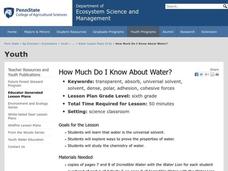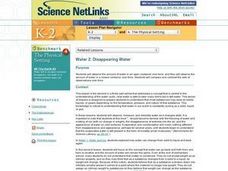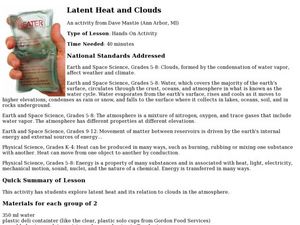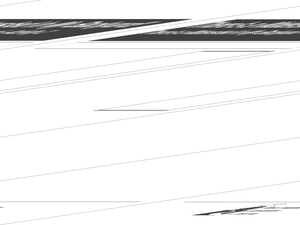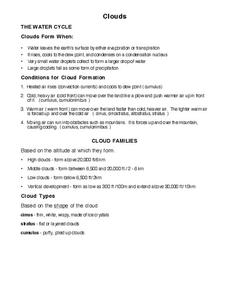American Chemical Society
Soda Can Steam Engine
Steam engines have been around since the late 1600s, yet most pupils don't know how they work. Using an soda can, the instructor builds a simple steam engine for scholars to observe. Through a discussion, young scientists learn about the...
Curated OER
The Atmosphere
Here is a suitable set of slides to use when teaching about the layers of the atmosphere, climate, global winds, and types of clouds. These slides will support a few different lectures. You will probably want to replace the diagrams with...
Center for Technology in Teaching and Learning
CSI: The Experience - Family Forensics
Forensic scientists depend on their observation skills to analyze evidence down to the molecular level. Middle and high schoolers practice making observations and predictions with a series of crime scene activities, which includes a...
Curated OER
How Much Do I Know About Water?
Sixth graders explore ways to analyze the properties of water and examine the chemistry of water. In this water lesson students work in groups and complete several activities.
Curated OER
Water, Water Everywhere, and Nary a Drop to Drink!
Students sing the continent song and locate oceans between the continents on a map. They read "They Earth is Mostly Ocean" and copy notes into their journals. They watch a demonstration of water and saltwater evaporated to see what is...
Curated OER
Water 2: Disappearing Water
Students will observe the amount of water in an open container over time and also examine the amount of water in a closed container over time. They then will compare and contrast the sets.
Curated OER
Latent Heat and Clouds
Students explore latent heat and how it relates to clouds in the atmosphere. In this earth science lesson students investigate how clouds are formed. Students examine clouds and the water cycle.
Curated OER
Driving Currents
Students conduct a variety of investigations to see how water, heat, and salinity affect the flow of the world's ocean currents,as well as, explore many factors that affect the flow of the world's ocean currents. They also describe in...
Curated OER
"Hard" Data from Space
Students use satellite images to analyze development patterns within Baltimore City. They prepare a land cover map for Baltimore indicating the prevalence of impervious surfaces and explore how these patterns affect water pollution.
Curated OER
Save the Bay
Students explore the concept of environmental stewardship. In this science lesson, students examine the environmental effects of oil spills as they replicate a contained oil spill and clean up.
Curated OER
Tour of the Frozen Ground
Students discuss and observe permafrost features in their local community and compare and contrast these features with those described in a novel. In this permafrost lesson plan, students invite an elder from their community to discuss...
Curated OER
Fuel Mystery Dis-Solved
Students describe how temperature and surface area exposure affect the rate at which fuel is consumed. They explain why engineers want to know about the properties of a fuel when designing rockets. They create a bar graph of result data.
Curated OER
Field Work
Learners realize that everyone lives in a watershed and that water is a fundamental life sustaining resource, they investigate ways to look at surface streams for quantity and quality of this vital resources. Students construct a...
Curated OER
There's a Watershed in my Backyard!
Students explain what the term watershed is by creating a model. In this science, geography lesson plan, students demonstrate how the water moves in a watershed. Additionally, students learn about point source and nonpoint source...
Curated OER
Be a Watershed - Create a Living River
Students investigate water ways by conducting an experiment with classmates. In this natural resources lesson, students define a watershed and identify where large ones are located within the United States. Students utilize...
Curated OER
King of the Mound
Students investigate water as an agent of change. They conduct an experiment involving a mound of soil, observe and record any changes that occur when ice melts on the mound of dirt, and create a drawing of the changes that take place...
Curated OER
What In The World Are Swim Bladders and Why Are They Important
For this swim bladders worksheet, students use a bowl, water, and balloons to make swim bladders, and answer short answer questions about them. Students answer 7 questions and interview someone who has been scuba diving.
Curated OER
pH
Learners use a Colorimetric test to measure pH and gain the importance to life in an aquatic ecosystem pH is. They explore the dramatic effect pH level can have on a water body. Students test the pH level of many water samples.
Curated OER
If I Were A Raindrop!
Students review the water cycle. In this water cycle lesson, students review the different stages of the water cycle. Students use the computer program Kid Pix Weather to help demonstrate understanding.
Curated OER
A Limnology Study of Drainage Ditches
Students chemically test water, observe microscopic organisms in the classroom, and screen the sample for macroinvertebrates. They design a reporting sheet that list all the items to be tested and a space to record the results.
Curated OER
Understanding Cloud Formation
Learners view a demonstration that simulates cloud formation. They read a poem about clouds, participate in a class demonstration using warm water and ice and write a paragraph summarizing their observations.
Curated OER
Earth's Hydrologic Cycle
Students examine the water cycle. In this hydrologic cycle lesson, students follow the provided procedures to demonstrate the how water moves around the planet through the dynamics of the water cycle.
Curated OER
Clouds
In this science worksheet, young scholars look for the meaning of the water cycle and its relation to the formation of clouds. They read the information about the different types of clouds.
Curated OER
Ocean Planet: Pollution Solution
Students explore the concept of environmental stewardship. In this science instructional activity, students investigate the impact of oil spills as they discuss historical spills. Students use problem solving skills to brainstorm...



